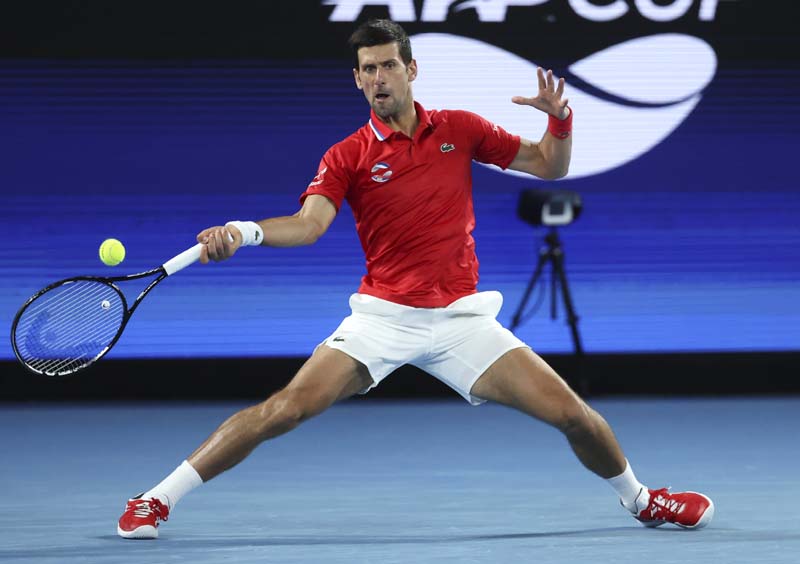

Maybe, just maybe, the thinking went, Novak Djokovic would be just a tad more susceptible to trouble this time around at the Australian Open.
After all, he wrenched his midsection during a slip in the third round and said he’d torn a muscle. Entering Sunday, Djokovic already ceded five sets in the tournament, the most he ever dropped en route to a major final. And he was facing Daniil Medvedev, owner of a 20-match winning streak.
Yeah, right. We’re talking about Djokovic at Melbourne Park, where his dominance is most certainly intact — nine finals, nine championships. Plus, he’s still gaining on Roger Federer and Rafael Nadal in the Grand Slam standings, now up to 18 overall, two shy of the men’s record those rivals share.
Djokovic used superb serving, his usual relentless returning and baseline excellence to grab 11 of 13 games in one stretch and beat Medvedev 7-5, 6-2, 6-2 for a third consecutive Australian Open trophy.
When the match ended after fewer than two hours, Djokovic dropped onto his back on the court. After greeting Medvedev, Djokovic went to the sideline, lifted his white shirt and peeled off pieces of beige athletic tape along his abdomen.
“It has been a roller-coaster ride for me, especially in the last couple weeks,” Djokovic said, cradling his silver trophy in his left arm.
He offered “special thanks” to his personal trainer, Ulises Badio, for helping him get through it and improve to a combined 18-0 in semifinals and finals on Melbourne’s hard courts.
“Probably, it’s not your last one,” Medvedev said. “I have no words to say.”
Djokovic, a 33-year-old from Serbia, has won six of the last 10 majors and will stay at No. 1 in the rankings at least through March 8. That will give him 311 weeks in the top spot, breaking another mark held by Federer.
The No. 4-seeded Medvedev was appearing in his second Grand Slam final; he was the runner-up to Nadal at the 2019 U.S. Open.
“He’s definitely one of the toughest players that I ever faced in my life,” Djokovic said. “It’s a matter of time before you’re going to hold a Grand Slam, that’s for sure.”
And then he joked to Medvedev, a 25-year-old from Russia who hadn’t lost to anyone since October: “If you don’t mind waiting a few more years …”
Medvedev had won his past 12 outings against members of the Top 10, but going up against Djokovic in Australia is a much different challenge.
As things slipped away, Medvedev bounced his white racket off the blue court, then absolutely destroyed it with a full-on spike. He kept looking up at his coach with palms up as if to ask, “What can I possibly do here?”
It is a familiar sentiment in this stadium: Federer, Nadal, Andy Murray, Stan Wawrinka, Dominic Thiem — all Grand Slam champions, all defeated by Djokovic in semifinals or finals in Melbourne.
So put Djokovic’s nine triumphs in Australia alongside five at Wimbledon, three at the U.S. Open and one at the French Open.
The math looks good for him. He is about a year younger than Nadal and 6 1/2 younger than Federer, who turns 40 in August and hasn’t competed in more than a year after two knee operations.
On a cool, cloudy evening, an event delayed three weeks because of the coronavirus pandemic closed with an announced attendance of 7,426. Spectators were barred for five days earlier in the tournament because of a COVID-19 lockdown, but they eventually were let back in at 50% capacity.
“There are a lot of mixed feelings about what has happened in the last month or so with tennis players coming to Australia,” Djokovic said. “But I think when we draw a line at the end, it was a successful tournament for the organizers.”
And for him.
Medvedev’s flat, wrap-the-racket-around-his-neck forehand was iffy at first, missing wide, long and into the net in the initial 10 minutes. Djokovic grabbed 13 of the match’s initial 16 points and a quick 3-0 lead. Soon enough, though, it was 3-all, then 5-all.
But that’s when Djokovic stepped up, and Medvedev stepped back. Djokovic held at love, then broke to claim the set when Medvedev slapped a forehand into the net just after someone in the crowd called out during the point.
Djokovic began the second set with a fault into the net, then shook his left arm and flexed his shoulders. That point ended with him missing a backhand into the net, and he glared at his guest box. Another netted backhand gifted Medvedev a break.
But the extreme experience gap showed there. Medvedev immediately relinquished his next two service games. In all, Djokovic broke seven times, won 73% of points when his first serves went in, and made merely 17 unforced errors to Medvedev’s 30.
Medvedev appeared to have a tiny opening at 4-2 in the third, getting to 15-30 on Djokovic’s serve with a forehand winner and waving to the crowd to make noise. As if viewing that as a personal affront, Djokovic took the next three points and the game, then pointed his right index finger to his temple and gritted his teeth.
Soon it was all over at a place Djokovic owns
“I would like to thank this court. I would like to thank Rod Laver Arena,” he said to conclude the trophy ceremony. “I love you each year, more and more.”